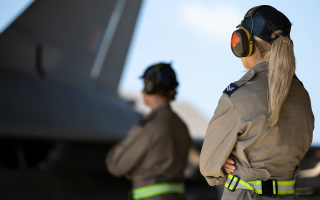Sitrep: Do petty playground tactics at the Korean border pose a risk of all-out war?
Have you heard of 'balloon warfare'? Chances are, you're aware of it in some form, but only if you live near the border between North and South Korea.
Earlier this month, North Korea flew balloons over the border, filled with trash like cigarette butts and manure.
The South has previously ballooned USB sticks full of K-pop into the North – as well as setting up loudspeakers to blare the music over the border.
- Sitrep: Could the amazing D-Day deception be repeated by our forces today?
- Sitrep: Put Brits in Ukraine to train forces and turn tide in war with Russia, Heappey says
- Sitrep: What happens during Nato summits after the doors are closed?
Robert Kelly, a professor of political science at Pusan National University in South Korea, was on the latest episode of the Sitrep podcast – which analyses the top defence stories of the week and is available wherever you get your podcasts.
He said these petty, playground warfare tactics happen a lot with both the North and South Koreans.
"If you take the demilitarised zone tour, for example, if you ever come to South Korea, they'll take you to a place where the two Koreas built quite competing flag towers," he explained.
"And the North Koreans insist on building the highest flag tower in the world, and, you know... everybody takes a picture of it.
"It's like half a mile high… but it comes back to your point, right? Sort of playground war.
"I think it's really because the two Koreas are trapped in such a tight, zero sum legitimacy contest that they feel like if they give on anything, that somehow is losing, because the two Koreas make directly competing, overlapping claims to control the peninsula."
Mr Kelly said he did not actually think this recent example means too much, but people were paying attention to it because it seems "so petty" and because of what the North was putting in the balloons, which is "pretty foul".
It is also not the only example of such tactics, with Sitrep's resident military expert Professor Michael Clarke explaining it happens between China and Taiwan and used to "go on between East and West Germany".
Prof Clarke gave the example of Kinmen, a pair of small Taiwanese islands within sight of mainland China,
"I have a knife, a kitchen knife, that was made for me in Kinmen… out of the shell casings, because for years the Chinese and the Taiwanese bombarded each other… with shells which were full of leaflets.
"These shells in Kinmen are now piled up, thousands of them and, every now and again, when visitors come around, they cut a piece of a shell out and there, in front of their eyes, they make a kitchen knife for you and inscribe your name on it and give you in about quarter-of-an-hour a completed knife, which is made out of a Chinese shell casing."
But it is not just manure and kitchen knives, and Prof Clarke explained the tactics are an example of old-fashioned psychological warfare.
"It's all about precedence," he said. "If you allow something to go unchallenged, the other side will say, 'Ah it's a precedent, you've not challenged it. So you accept our legitimacy to do what you didn't respond to'.
"And so everything has to have a response."
He added: "That's why, right up to the biggest level, like military exercises and military confrontations, down to the smallest level, like throwing leaflets at each other, it's all a competition in maintaining the status quo and establishing that the other side does not have a precedent to step over the line.
"It seems childish, but there is a political reason behind it."
But what about escalation? Mr Kelly said his concern is that these petty attacks spiral out of control.
"The real problem is that you get a crisis and you get like a tit-for-tat escalation," he said,
"If you get into that kind of tit-for-tat escalation spiral, that's a real problem, because I think crisis stability in Korea is really poor.
"The two sides have very, very strong incentives to move first. Both sides are really vulnerable to the other.
"North Korea's nuclear weapons are very vulnerable to a counter force first strike… South Korea cities are very few and they're very concentrated, so it's to North Korea's advantage to launch its weapons first."
He went on: "My concern is not day-to-day deterrence in Korea, I actually think it's pretty stable.
"The concern, I think, is you get a crisis and then things spin out of control and you have these massive first use incentives on both sides."
You can listen to Sitrep wherever you get your podcasts, including on the Forces News YouTube channel.







